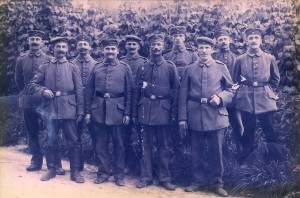Jewish Literary Links for Shabbat
Shabbat shalom!
Shabbat shalom!
Shabbat shalom!
Shabbat shalom!
I’ve been quietly reading as much as I can find about Richard Holbrooke since the diplomat’s unexpected death earlier this month. And I’ve noticed that in several articles, including this reprinted excerpt from Abigail Pogrebin’s Stars of David: Prominent Jews Talk About Being Jewish, mention has been made of a certain photograph close to Holbrooke’s heart:
A New York Times profile of Holbrooke during his tenure in Germany described how he displayed, in his elegant ambassador’s residence, a photograph of his grandfather in a World War I uniform: “I show it to German visitors as a symbol of what they lost,” Holbrooke told the Times. When I ask him about it now, he shows me the very picture. “Every German family has a photograph like that. And so I just kept it in the living room. Some people would ignore it; others would stop and stare at it. Some would demand to know why it was there—what was the message I was sending? I said, ‘This is an existential fact; this is my grandfather. You may read anything you wish into this photograph.’ And I also said, ‘If history had turned out differently, maybe I’d be Germany’s ambassador to the United States instead of America’s ambassador to Germany.’ My mother didn’t like it at all. She said it was a militaristic picture and there are a lot of nicer pictures; she’s not into symbolism at all. And it’s true; I could have had an ordinary picture of my grandfather. But don’t you find that picture—the original, with his handwriting—extraordinary?”
I don’t know about every German family, but my German-Jewish (now American) family has a photo like this, too. And I have a copy in my home, clustered within a group of other family photographs. It depicts my great-grandfather, Kaufmann Dreifus, with his German soldier fellows.

We’re not sure of the date, but we know that Kaufmann (like the character modeled after him in “Matrilineal Descent,” the second story in my forthcoming short-fiction collection, Quiet Americans) served his native Germany in World War I. (He died a few years later, a diabetic before insulin became widely available.)
It’s true. I, too, could display an ordinary picture of my great-grandfather.
But don’t you find this picture—not to mention the fact that a copy remains for me to scan into a computer from my home in New York City—extraordinary?
A side note: I reviewed Stars of David when it was published five years ago. To read the review, please click here.
First, the Jewish Book Council lured me into opening a Twitter account–against my better, time-preserving judgment–so that I could participate in its online book club/discussions (the next one of which, featuring Julie Orringer and her amazing novel, The Invisible Bridge, happens to be taking place today at 12:30 p.m. EST).
But at least Twitter doesn’t cost anything. Now, thanks to my recent trip to Israel, I’ve finally succumbed and joined Netflix. Which does cost something (beyond time).
Here’s what happened: One warm Jerusalem afternoon, our group meandered over to the Hebrew Union College campus for what was billed as a session with an Israeli screenwriter and film critic. That gathering proved to be one of the highlights of the trip.
The screenwriter/critic, Galit Roichman, contextualized and presented clips from three Israeli films: Walk on Water (2004), Turn Left at the End of the World (2004), and The Band’s Visit (2007).
Suffice to say that I wished we could have stayed hours longer, to watch all three films in their entirety and to get more recommendations from the presenter (she has promised to assemble a list and forward it to our trip organizers, and I’m going to follow up on that). I knew I’d have to see those films somehow, so once my suitcases were unpacked and my jet lag had abated, I finally gave in and opened a Netflix acount.
The first film listed on my queue, Netflix promises, will arrive today. (It’s Walk on Water.) Meantime, anyone else want to suggest some Israeli films for me to view?